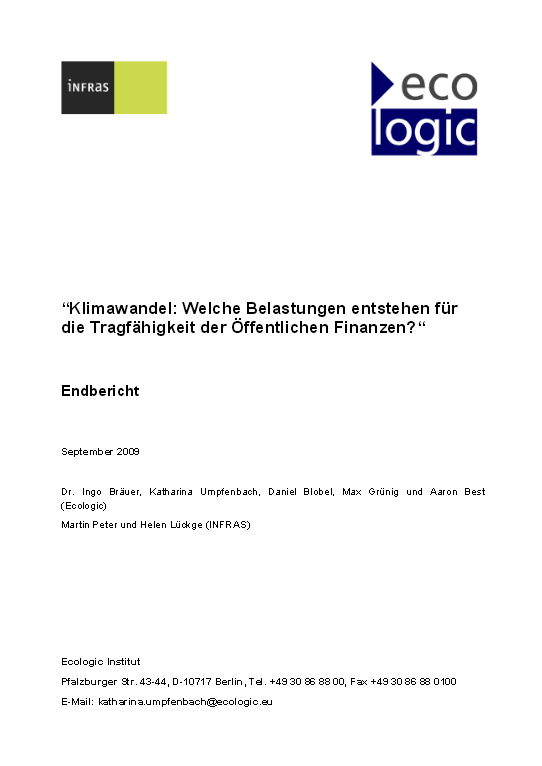Climate change will alter the basis of economic activity in Germany. It will therefore also affect public finances. On behalf of the Federal Ministry of Finance, the Ecologic Institute and Infras explored the extent to which the economic impacts of climate change might threaten the sustainability of public budgets in Germany. The results indicate that, in the event of unabated climate change, additional costs and revenue losses could amount to 0.6 to 2.5 percent of GDP. The Final Report is now available on our website.
Background
The 4th IPCC Assessment Report warns of the imminent dangers linked to global climate change. Regional differences in climate change are substantial, but the fiscal consequences for public budgets are, so far, largely unexplored.
Objective of the study
The project team developed a long-term forecast on the fiscal impacts of climate change on public budgets in Germany. To this end, the team evaluated data and results from IPCC SRES climate scenarios and the regional climate modeling for Germany based on the models WETTREG and REMO.
Key results
- In 2100, climate change could result in 27 to 120 billion Euros of additional costs and revenue losses for the public budget, equal to a GDP loss of 0.6 to 2.5%.
- The results for 2050 show a more ambivalent picture: Depending on the prevailing impact, climate change could either result in a fiscal burden of up to 0.25% of GDP, or, with a smaller probability, in a net benefit.
- Regarding the sector-specific impacts, changes in international trade and tourism demand were found to incur the most important changes. Due to a drop in demand for German export goods in the world regions most affected by climate change, export industries are expected to suffer from income losses. By contrast, positive effects are likely to dominate in the tourism sector.
- For sustainability of public finances, climate change represents a risk that is comparable in magnitude to the burden caused by the ageing population. However, while the costs caused by demographic change will peak around 2050, costs of climate change will only increase substantially in the second half of the century.
Ecologic developed the scenarios to be used within the project. Furthermore, Ecologic builds causal chains to illustrate the link between climate change parameters such as temperature, precipitation, sea level-rise or wind and economic sectors. The real economic effects can affect public finances either directly or indirectly.
Direct impacts include costs arising from the liability of the public bodies which increase fiscal spending, e.g. as a result of infrastructure damages or disaster management. In addition, there are also indirect impacts resulting from positive or negative changes in value added in certain sectors which increase or decrease fiscal revenues. Examples include reduction in economic output after storms or flooding, but also positive effects such as an increase in tourism income due to higher demand for German tourist locations.
To discuss the methodological approach, an expert workshop was held in the Finance Ministry.



